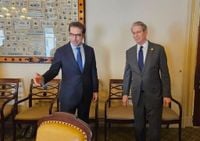Spain is currently navigating a complex diplomatic landscape as it balances its relations with the United States and China amid escalating trade tensions. On April 15, 2025, Spanish Economy Minister Carlos Cuerpo met with U.S. Treasury Secretary Scott Bessent in Washington, where discussions centered on military spending and the controversial Google tax.
During the meeting, Bessent emphasized the importance of increasing Spain's defense budget to meet NATO obligations. "Madrid must spend more on defense to meet its NATO obligations," he stated, underscoring the U.S. government's ongoing concerns about European nations' defense expenditures. President Donald Trump has been vocal about his dissatisfaction with European allies, urging them to contribute more financially to their own security. He has warned that the U.S. may not come to their aid in the event of an attack unless they step up their military spending.
Despite the stern message from Washington, Cuerpo characterized the meeting as "constructive" and expressed optimism about future negotiations. "It was a very constructive, very useful meeting, and a very good first contact for continuing to maintain relations from now on on all issues that benefit us and that are of mutual interest to us," he remarked. The Spanish minister noted that the discussions provided an open door to negotiations regarding the ongoing trade war.
The backdrop of this meeting is a 90-day moratorium on tariffs that began last week, a move aimed at easing tensions between the U.S. and China. Spain finds itself in a precarious position, attempting to maintain good relations with both powers. Cuerpo defended Europe’s growing ties with China, which have been criticized by U.S. officials. Just days before the meeting, Prime Minister Pedro Sánchez met with Chinese President Xi Jinping in Beijing, where he advocated for closer trade relations. Bessent’s comments reflect a growing frustration with Spain's approach, as he stated, "I’m not sure if the prime minister or the Spanish economy minister made some comments this morning [to the effect that] we should all align ourselves more with China. That would be like cutting your own throat."
The U.S. Treasury Department's summary of the meeting was notably terse, lacking the usual diplomatic language that emphasizes common interests and shared goals. Instead, it described the conversation as "frank," a term that suggests a more serious tone than typical diplomatic summaries. The summary highlighted the U.S.'s continued opposition to Spain's digital services tax, commonly referred to as the Google tax. This tax has been a point of contention between the two nations, with U.S. officials arguing that it creates unfair barriers to trade.
In addition to the Google tax, the U.S. has raised concerns about various non-tariff barriers that affect American companies operating in Spain. A detailed 397-page report outlines grievances against Spain, which include film regulations that prioritize co-official languages, European production quotas imposed on streaming platforms like Netflix, and the treatment of pharmaceutical companies. These issues reflect broader tensions in trade relations, as the U.S. seeks to ensure a level playing field for its businesses abroad.
As the negotiations unfold, Spain's government faces the challenge of balancing its economic interests with the pressures from Washington. The Spanish administration is keen to showcase its ability to foster strong ties with the U.S. while also pursuing beneficial relationships with China. This balancing act is crucial, especially given the current geopolitical climate where countries are increasingly being forced to choose sides.
The next steps for Spain involve navigating these complex discussions while ensuring that its economic sovereignty is maintained. Cuerpo's positive outlook on the meeting may signal a willingness from both sides to explore compromises, but the underlying tensions regarding military spending and trade policies remain significant hurdles.
In the coming weeks, Spain will need to respond to the U.S. demands regarding defense spending and the elimination of the Google tax. How Spain manages these requests could have far-reaching implications not only for its relationship with the U.S. but also for its standing among European allies and its economic ties with China.
As the situation develops, the Spanish government is likely to face increasing scrutiny from both domestic and international observers. The outcome of these negotiations will be pivotal in shaping Spain's foreign policy direction and its economic landscape in the years to come.






